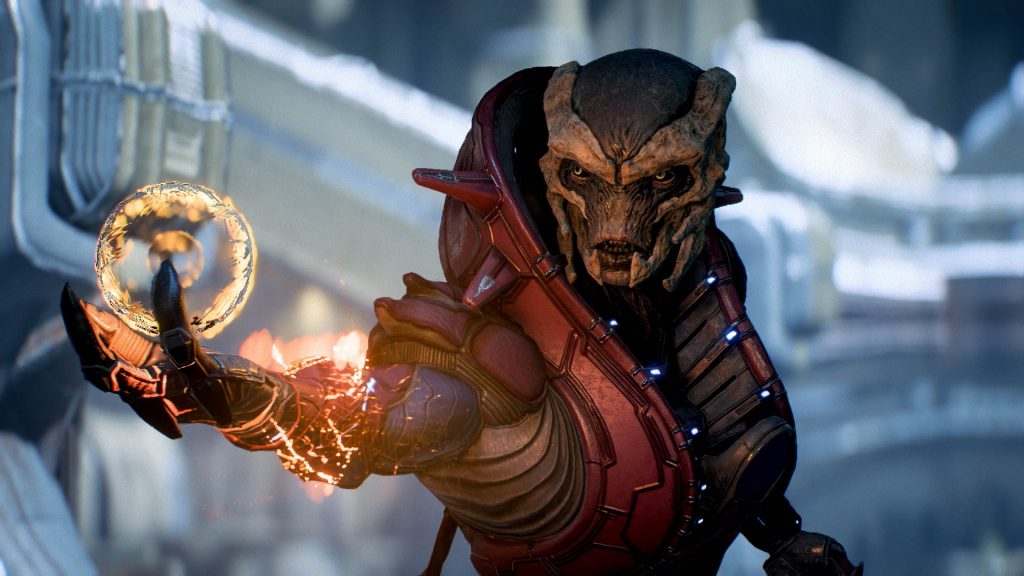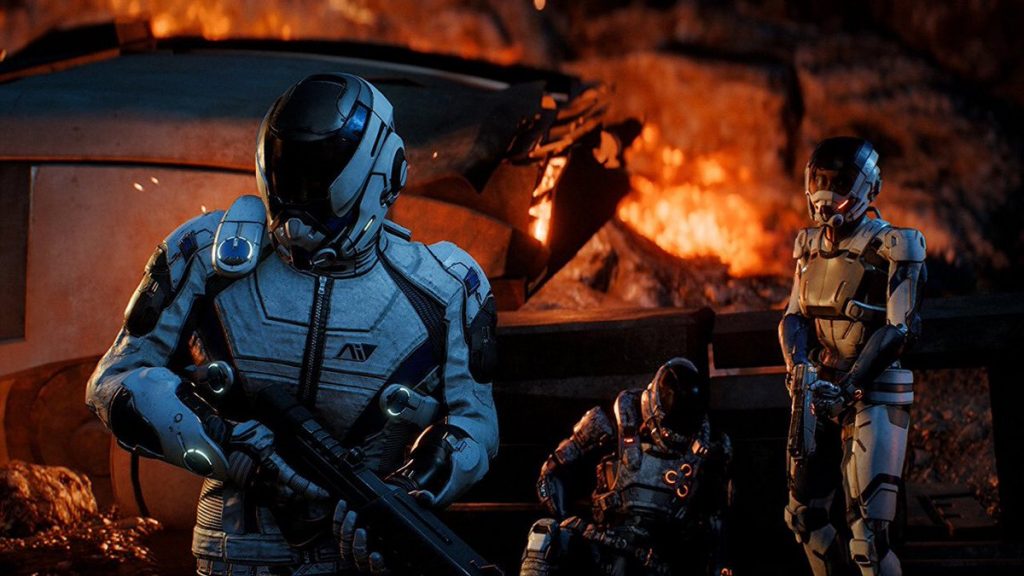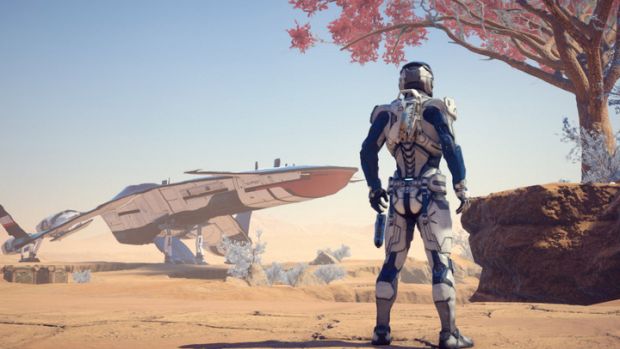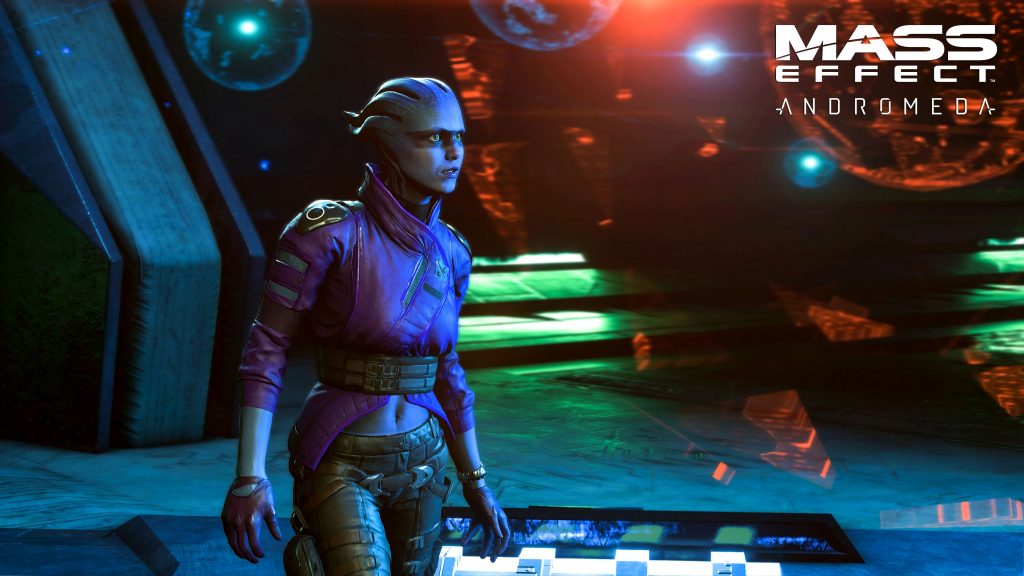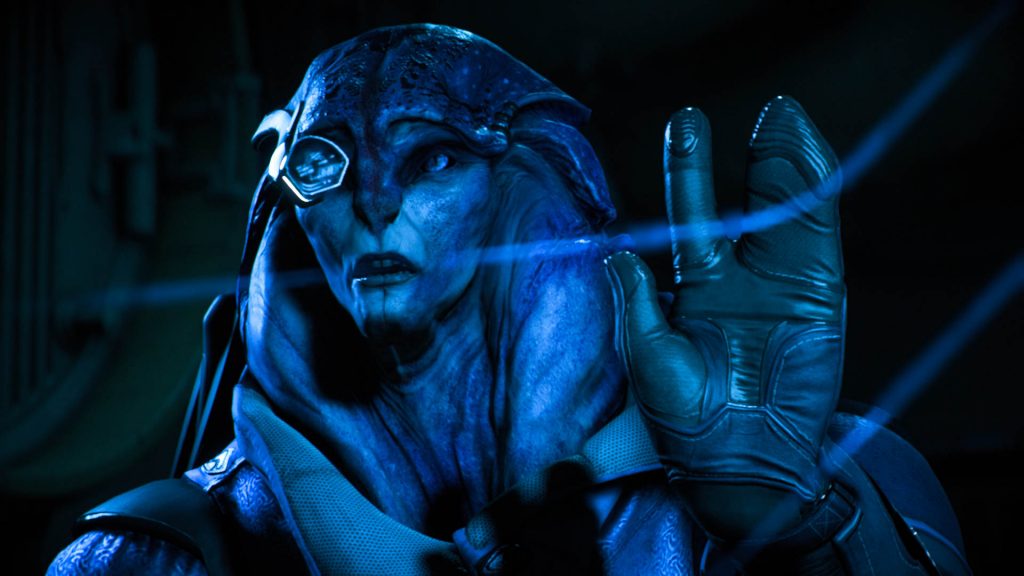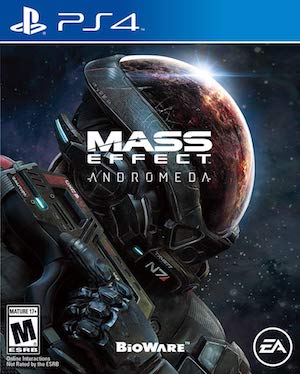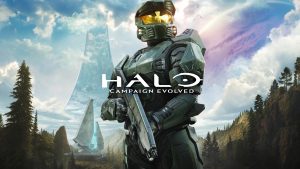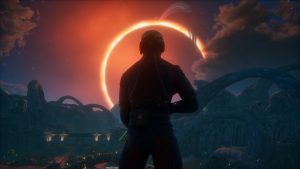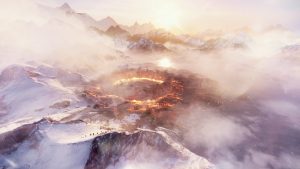
Mass Effect represents Bioware’s finest game series yet and in more ways than one cemented the company’s stature as a leading RPG developer. The Mass Effect trilogy brought unique aspects into video games- the idea of dealing at a political level with a vast variety of aliens, each with their own political agendas was never implemented in such an effective manner. The series was marked by a bold and colorful cast of characters led by the one and only Commander Shephard, while pitching the players against a rather intriguing cast of enemies such as Saren, the Illusive Man, and, of course, the Reapers. And although the trilogy ended in a rather controversial way, there is no denying that as a whole, Mass Effect made an impact on the industry like no other series could do at the time.
But things have changed in the last five years or so. With the RPG genre undergoing something of a mini-renaissance thanks to the likes of The Witcher 3: Wild Hunt and Horizon: Zero Dawn, the genre has now almost reached a point of saturation. After all this is the “open world” generation and it is being defined mostly by role playing games. So in this regard, how does Andromeda fare in comparison to its brilliant predecessors? Does it surpass them or does it manages to provide a equally satisfying experiences? Or does it fall in the same traps of mistakes that so many RPGs do these days, and ultimately becomes something of a spin off to the main trilogy?
Commander Shephard’s story finished with the trilogy, and this allowed Bioware to begin afresh with a new setting. Although technically not a sequel to any of the original games, Andromeda takes place more than 600 years after the events of Mass Effect 3. As part of the Andromeda Initiative, humans and other species left the Milky Way galaxy after the events of Mass Effect 2 and before the Reaper war went into gear in Mass Effect 3. After travelling for several centuries and staying alive for so long thanks to cryogenic technology, the team finally reaches the Andromeda galaxy. This is when protagonist Ryder wakes up. Ryder can be either male or female (Scott or Sarah) depending on player choice.
"Andromeda is a fresh start for the series and in many ways this reflects in the characters themselves. Compared to Commander Shephard, who was already a well-known hero before the events of Mass Effect 1, Ryder in Andromeda feels relatively green."
Surprisingly and – to an extent – shockingly, our hero is expected to resume his role as a member of the Pathfinder team within minutes of waking up. As a member of the Pathfinder team, it will be Ryder’s duty to assist his father Alec Ryder, the lead Pathfinder, to find humanity and the other alien species a new home in the Andromeda galaxy. The Andromeda Initiative has already selected several “Golden Worlds”, which are essentially planets that potentially have favorable conditions for humans and the other species to settle upon. However, things as expected go wrong. “Habitat 7”, one of the many golden worlds, turns out to be a hostile environment with environmental conditions not suitable for life, contrary to what the long range scans indicated earlier, not to mention the fact that several Andromeda Initiative arks have gone missing.
After landing on Habitat 7, the Pathfinder team comes across the Kett, the game’s primary enemy. After taking down the initial horde of enemies, the team comes across an alien monolith. The monolith is the reason behind the Habitat 7’s hostile environmental conditions and shutting them down returns the conditions to normal. For some reason, the Kett too are behind these monoliths and as the game moves forward, certain events force Ryder to become the new Pathfinder leader, replacing his father.
Andromeda is a fresh start for the series and in many ways this reflects in the characters themselves. Compared to Commander Shephard, who was already a well-known hero before the events of Mass Effect 1, Ryder in Andromeda feels relatively green. Initially his inexperience shows in the way he talks to other characters, cracking jokes and failing to take several situations seriously. This lack of seriousness, at least initially, suits the character, as the game is all about building your own legend contrary to the trilogy where Shephard’s role as a popular figure in the galaxy was already established.
"From a narrative perspective, the game begins rather slowly. In the first few hours of the game, you will be asking yourself several questions about the game. But unlike the trilogy, the answers to those questions are usually rather predictable."
As such, you should not expect the new cast of characters to be in line with the likes of Urdnot Wrex or Garrus Vakarian. Ryder’s team is young and comes off as rather inexperienced in comparison. So yes, the new team lacks the attitude of the original members, but this fits the tone and thematic shift the game is aiming for. That said, Andromeda also makes use of some unnecessary one liners here and there via character interactions, resulting in some cringe-inducing moments. We are all for variety but the Mass Effect series is no way comparable to the likes of Uncharted (they both aim to be two very different things), and Ryder is no Nathan Drake. As a result, it often feels like the game tries too hard to make the player relax via these offbeat conversations. But other than these annoying one liners, dialogue writing is implemented well overall.
However, the dialogue wheel accompanying them is unbalanced. Bioware have done away with the Paragon/Renegade system of the past games and instead replaced it with four-way choices, which depends on Ryder’s emotions. The main problem, though, is that not all dialogues will have all four options, which kind of makes this new system redundant at times. In fact, many times we found the same two options repeating over and over again. It makes sense that that context matters in dialogues and responses, but when the game’s system makes choices so limited and often binary, it becomes hard to get over.
From a narrative perspective, the game begins rather slowly. In the first few hours of the game, you will be asking yourself several questions about the game. But unlike the trilogy, the answers to those questions are usually rather predictable. This isn’t necessarily a bad thing, but it’s ultimately a tad disappointing, because the build-up to the game’s conclusion is thrilling and exciting, and you will be expecting the game to throw some cool twists your way, which, unfortunately, doesn’t really happen.
"Andromeda works best as its own, isolated story, disconnected from the main trilogy, which is something Bioware have been transparent about during the pre-launch period."
What also doesn’t help the narrative is the fact that the main antagonist of the game, is in many ways a disappointing villain, and devoid of any personality. We cannot really go into the motivations of the Archon without entering spoiler territory, but given the fact that this series has given us the likes of Saren and the Illusive Man as main villains, the antagonist in Andromeda really feels like a letdown.
Mass Effect: Andromeda also drifts away from the political themes of the original trilogy. This is not to say there are no political undertones in the game whatsoever, but they seem rather toned down in comparison to the original trilogy. There are some power struggles between differences species in the Nexus, which serves as the surrogate Citadel of Andromeda, so those political tensions are not totally absent. What’s more, the lack of focus on such consequences kind of makes sense, given the fact that Ryder is more of an explorer rather than someone who has a deep knowledge about how politics work. As such, you should not not expect any major consequences for your actions, which is a step down from the trilogy. Rather, the consequences in Andromeda are much more personal to the Ryder family. As a result, the story is, ultimately, good, and it opens up possibilities for future games in the series, but it doesn’t manage to even come close to the scope of the narrative in the original trilogy. Andromeda works best as its own, isolated story, disconnected from the main trilogy, which is something Bioware have been transparent about during the pre-launch period.
Besides the main mission, Andromeda also offers a wealth of other quests in the form of side missions, loyalty missions (which make a comeback after being absent in Mass Effect 3) and sending Strike Teams for different objectives. Side missions mostly devolve into being fetch quests, but plenty of them are actually surprisingly good and well designed. We won’t go into much detail, for obvious reasons, but a number of side missions will make you travel to different locations across the galaxy, spanning hours, and the end results will be surprisingly better than what you’d have expected. Most of the optional missions, pleasantly enough, aren’t shoved down your throats, and you’ll only come across them if you bother exploring and taking your time with the game’s open environments. For example, in the introductory mission itself, we were merely aiming to complete the main mission without exploring much of the open environments, which meant that only about a couple of the optional missions were unlocked. However, when we played the same mission again and turned our attention to exploration, we were pleasantly surprised to find even more dynamic quests, and that original number of two to three missions more than doubled.
"The RPG mechanics in Andromeda, however have been thoroughly refined and are more in line with modern RPGs. The skills and abilities system are the stars of the show, offering a multitude of options and upgrades across various categories such as Biotic, Tech and Soldier, along with individual classes for different types of weapons."
Loyalty missions, on the other hand, are an altogether different beast. They are quite similar in concept to the ones in Mass Effect 2, and as such Andromeda makes them feel like they are a part of the main quest, but they don’t effect the game’s main plot like they did in Mass Effect 2. Expecting the same standard as Mass Effect 2 is unfair, given how incredible the loyalty missions in that game were, but even so, here in Andromeda, they come very close to that level of quality in terms of fleshing out your crew’s backstories and presenting the player with some amazing dialogue exchanges.
Andromeda also features a character customization feature. You can, of course, customize anything from your character’s head to their face, insert tattoos and marks. It has all the necessary things to make your character look as goofy or realistic as you want. However, you will need to go through unnecessary steps even to modify one single aspect. This clunky user-interface is unfortunately not only limited to character customization, but the entire menu system as a whole. Often they seem unnecessarily overwhelming, and as such can result in confusion in allocating skill points or selecting a mission from the map. The UI has always been an issue with Bioware games, especially Mass Effect, so it is disappointing to see that it hasn’t been fixed here.
One of the major complaints for Mass Effect 2 and Mass Effect 3 despite being amazing games, was that they never felt like proper RPGs, which is what they were officially supposed to be. The first game had quite deep and extensive role playing mechanics, and although the sequels did have some of those mechanics too, they felt more like third person action shooters. The RPG mechanics in Andromeda, however have been thoroughly refined and are more in line with modern RPGs. The skills and abilities system are the stars of the show, offering a multitude of options and upgrades across various categories such as Biotic, Tech and Soldier, along with individual classes for different types of weapons. Completing more missions will unlock skills points, and these can be used to unlock further powers. Each of these abilities further unlock a dozen or so more sub-abilities, which makes the said ability even more powerful, adding more variety to them. Heck, the game even lets you customize the Nomad (the game’s Mako, which, by the way, handles ten times better, thankfully enough), allowing you to increase boost speed, mining capabilities and a host of other things.
"Enemy AI for the most part is alright but the same cannot be said about your team mates, especially when you are exploring the world. For some odd reason, your team mates will take a rather unusual path at times…they will eventually follow you but instances such as this feel odd and out of place."
Guns and weapons too vary in style and design, depending on where or who they belong to. For example, the game presents you with guns from the Milky Way, which are quite similar to the ones used by Shephard in the trilogy, or new types of guns which you will come across in the Andromeda galaxy. Every weapon type will behave differently, depending on which galaxy they belong to, adding more versatility to the game’s excellent, fast combat, which can best be compared with Gears of War. Shooting feels extremely tight and guns in a Mass Effect game have never felt better. Add to that the jet pack and what you have is an extremely cohesive, fast and mobile combat system.
Enemy AI for the most part is alright but the same cannot be said about your team mates, especially when you are exploring the world. For some odd reason, your team mates will take a rather unusual path at times…they will eventually follow you but instances such as this feel odd and out of place. However, in battle they seem to be a competent bunch and will most likely be quite aggressive while taking down enemies. Furthermore, Ryder can command his crew but the system seems more like an afterthought with extremely limited options.
You can also build your own weapons in the game, for which you need to find required resources using your scanner, which can actually take a lot of time. Fortunately, you can buy some of the resources from in the game so that will help speed up the process. Crafting your own weapons in the game is rewarding and can lead to you obtaining some really powerful weapons, even though you don’t really need them to complete the game. Regardless, the crafting system is a nice add-on to the already excellent RPG systems on offer.
Another area of the game you will probably be investing quite a bit of time in is the multiplayer component. As someone who plays Mass Effect for its single player campaign, I was disappointed by the way Bioware tied up the single and multiplayer components in Mass Effect 3. The Galactic Readiness system should ideally have been dependent on single player only, but instead the developers made it tie into the multiplayer in a contrived manner, so much so that the endings actually changed based on how much of the multiplayer you had played. Thankfully, this is no longer the case in Andromeda. Players can take part with other players and take on hordes of aliens (much like Gears of War and Mass Effect 3 itself), which results in loot for both single and multiplayer components. You can also form your own strike team and send a team to do your work for you, so if you wish, you can completely avoid the multiplayer component all together and yet gain rewards for it via the strike teams.
"It always seemed as if Mass Effect: Andromeda would have a hard time hitting the same heights and level of glory as the original trilogy, but that is not really that bad of a thing at all. It almost seems like an unrealistic expectation. Andromeda purposely moves itself away from the original trilogy and sets the scene for future games."
Mass Effect: Andromeda on the PC is quite the looker, especially with a GTX 1080 on Ultra settings. The world and level design is superb and there is a real sense of discovery and mystery in some locations. The game presents you with a number of unique locations, each with their own set of alien life forms and architecture. The environments and the various post processing effects come together to create a beautiful experience. Unfortunately, the game disappoints in its animation department, as you may have heard by now. It can be downright awful at times- often times it almost feels like the characters’ eye balls will pop out and fall to the ground. What is surprising is that the alien design and their animations are actually quite good so this issue looks to be only limited to human NPCs or aliens that look like them. The game also suffers from minor glitches and lack of polish in some places, but nothing that will hamper your experience in any significant way.
Mass Effect: Andromeda is not an orchestral power house but it utilizes some new background themes along with some of the old ones, all of which sound equally good. We do have one complaint, though, in that most of the times there will be no music during exploration. We really wish they could use more of it, since the existing score is quite good. Voice acting too is fine and gets the job done at the end of the day. That, unfortunately, is all that can be said about it.
It always seemed as if Mass Effect: Andromeda would have a hard time hitting the same heights and level of glory as the original trilogy, but that is not really that bad of a thing at all. It almost seems like an unrealistic expectation. Andromeda purposely moves itself away from the original trilogy and sets the scene for future games. As of right now, Andromeda feels like its own game and should be treated as such. You will be disappointed if you gauge it against its amazing predecessors, but on its own, it’s a space opera that you don’t want to miss out on.
This game was reviewed on the PC.
Wealth of content on offer; A story that remains intriguing for the majority of the time; Combat is fast and slick; Tons of things to customize; Beautiful vistas.
Awful animations; A forgettable antagonist; Inconsistent moment-to-moment character interactions; Predictable conclusion.









